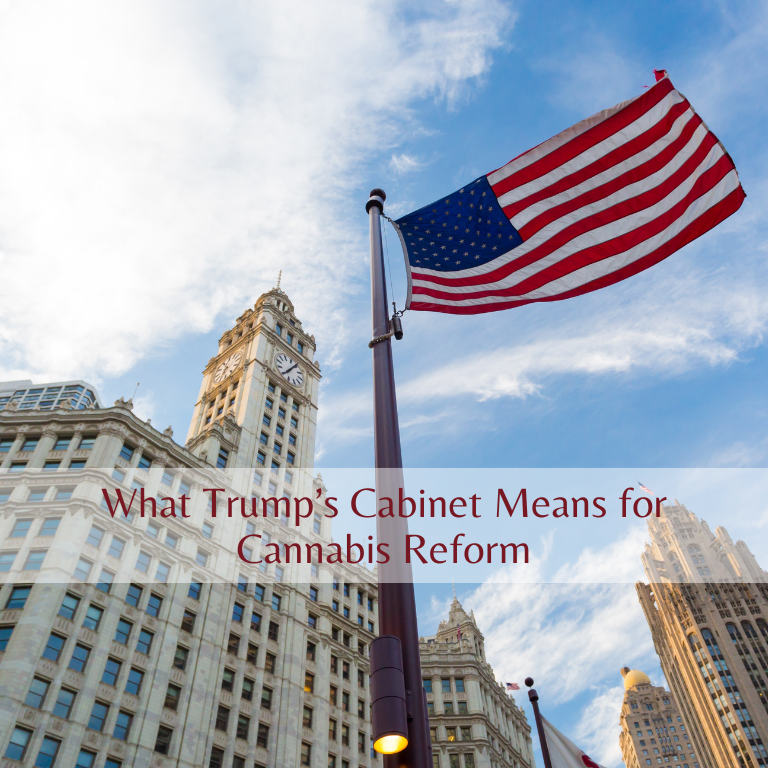Trump’s Cabinet Picks: Impact on Cannabis Reform

Cabinet Picks Signal Potential Shifts in Cannabis Policy Under Trump Administration
As the dust settles following the U.S. presidential election, President-elect Donald Trump’s initial cabinet appointments are shedding light on what the cannabis industry might anticipate over the next four years. Two of Trump’s controversial picks, Matt Gaetz for Attorney General and Robert F. Kennedy Jr. for Secretary of Health and Human Services (HHS), could play pivotal roles in shaping federal cannabis policy.
While Trump’s personal stance on cannabis has been inconsistent, these appointees bring clear, and in many ways, favorable views on cannabis reform to the table. Their positions could pave the way for significant policy changes that impact everything from legalization efforts to banking regulations.
Matt Gaetz: Attorney General Nominee
One of the most surprising and contentious picks is Congressman Matt Gaetz as Trump’s nominee for Attorney General.
A Controversial Choice
Gaetz’s selection has raised eyebrows due to his limited legal experience and ongoing scrutiny. Having worked only briefly in law at the local level, he lacks the extensive credentials typical of an attorney general. Furthermore, Gaetz has been under investigation by the Department of Justice for nearly three years over allegations of sex trafficking involving a 17-year-old. He has denied these claims, and the case remains unresolved.
Adding to the controversy, Gaetz resigned from Congress days before the House Ethics Committee could release its findings, effectively ending its jurisdiction over the investigation. If confirmed, he would head the very department that has been investigating him.
Gaetz’s Cannabis Reform Track Record
Despite the controversies surrounding him, Gaetz has a notable history of supporting cannabis reform:
State-Level Advocacy: In 2019, Gaetz worked with Florida Governor Ron DeSantis to expand the state’s medical cannabis program, including the legalization of smokable cannabis products.
Federal Efforts: Gaetz was one of the few Republican representatives to back the Democratic-led Marijuana Opportunity Reinvestment and Expungement (MORE) Act in 2022, which sought to legalize cannabis and address social justice issues stemming from prohibition.
Legislative Sponsorship: He has co-sponsored numerous cannabis-related bills, advocating for increased research, expanded access for veterans, and reduced banking restrictions for cannabis businesses.
DEA Oversight: Gaetz has publicly criticized the Drug Enforcement Administration (DEA) for its inaction on cannabis reclassification and pressed for timelines on rescheduling reviews.
Military Recruitment: He introduced an amendment to the National Defense Authorization Act to end cannabis testing for military recruits, tying the policy change to addressing recruitment challenges.
A Mixed Stance on Legalization
While Gaetz supports cannabis reform, his stance is not without nuance. He opposed a 2024 Florida ballot initiative to legalize recreational cannabis, arguing that such measures should be decided legislatively, not through constitutional amendments.
Should Gaetz be confirmed, his vocal support for reform could influence the Department of Justice’s approach to cannabis policy, including rescheduling or even descheduling marijuana.
Robert F. Kennedy Jr.: Nominee for Secretary of Health and Human Services
Another headline-grabbing appointment is Robert F. Kennedy Jr., a figure as polarizing as he is influential.
A Surprising Nomination
Kennedy’s nomination as Secretary of HHS has shocked many, given his history of promoting anti-vaccine misinformation and opposing fluoride in drinking water. His appointment reflects Trump’s desire to shake up public health agencies, with Kennedy tasked with removing corruption, restoring evidence-based medicine, and addressing the chronic disease epidemic.
Kennedy’s Cannabis Policy Agenda
Kennedy’s approach to cannabis policy aligns with his broader vision of reforming public health systems.
Advocacy for Medical Use: Kennedy has been a vocal proponent of using cannabis and psychedelics for therapeutic purposes, particularly for conditions like PTSD, depression, and addiction recovery.
Beyond Rescheduling: In line with his campaign proposals, Kennedy has signaled support for moving cannabis to a lower schedule or even descheduling it entirely, pushing beyond the DEA’s current proposal to reclassify marijuana as a Schedule 3 substance.
Banking and Economic Integration: Kennedy advocates for easing banking restrictions on cannabis businesses, a move that would integrate the industry into the broader financial system and foster stability.
Tax Revenue Allocation: He proposes using cannabis tax revenues to fund therapeutic recovery centers, ensuring that legalization efforts prioritize societal benefits.
A Balanced Approach
Kennedy supports tightly controlled access to cannabis and psychedelics under medical supervision rather than unrestricted commercial legalization. He has warned of potential corporate exploitation in these industries and emphasized the need for regulations that safeguard public welfare over profit motives.
Potential for Sweeping Reform
If confirmed, Kennedy’s leadership at HHS could bring transformative changes:
FDA Influence: As HHS oversees the Food and Drug Administration (FDA), Kennedy could expedite research into cannabis and psychedelics, potentially leading to expanded therapeutic applications and streamlined drug approvals.
Policy Innovation: His proposals could introduce a more assertive approach to cannabis reform, contrasting with the incremental changes seen under previous administrations.
What This Means for the Cannabis Industry
The combined influence of Gaetz and Kennedy could mark a turning point for federal cannabis policy.
Prospects for Rescheduling
Both appointees have expressed frustration with the current classification of cannabis as a Schedule 1 drug. While the DEA has proposed moving it to Schedule 3, Gaetz and Kennedy may push for more comprehensive reforms, including descheduling.
Banking and Business Regulation
Easing banking restrictions has been a long-standing goal for cannabis advocates. With Kennedy at HHS and Gaetz at the DOJ, the industry may see progress on this front, enabling businesses to access traditional financial services and reducing operational risks.
Social Equity and Research
Gaetz’s support for expungement initiatives and Kennedy’s emphasis on therapeutic uses highlight a commitment to addressing the social and medical aspects of cannabis policy. Increased funding for research and recovery programs could further legitimize the industry.
Challenges Ahead
Despite their favorable views on cannabis, both Gaetz and Kennedy come with significant baggage that could hinder their confirmation and effectiveness. Their controversial pasts may create political roadblocks, and their nuanced stances could alienate stakeholders who favor either full legalization or a more conservative approach.
Trump’s cabinet picks for Attorney General and HHS Secretary signal a potential shift in federal cannabis policy. While Matt Gaetz and Robert F. Kennedy Jr. bring controversy to their respective nominations, their track records suggest an openness to significant reforms.
The cannabis industry will be closely watching their confirmation processes and subsequent policy directions, as their appointments could shape the trajectory of cannabis legalization and regulation for years to come.
Stay informed about the latest cannabis industry developments with Cannabis Risk Manager.











